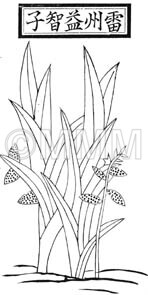Crude drug sample data base
※Click on the image to enlarge it.
The capital city, provincial capital city or the representative
location of its administrative area is indicated.
location of its administrative area is indicated.
Production area information
People's Republic of China
https://ethmed.toyama-wakan.net/img/pin_san.png
35.6894875
139.69170639999993
Collection information
Japan,Tokyo
https://ethmed.toyama-wakan.net/img/pin_nyu.png
Scientific information data base
| Common name | 益智, Yizhi, Alpiniae Fructus (JP18), Alpiniae Oxyphyllae Fructus (CP2020) , Bitter Cardamon (JP18), Sharpleaf Glangal Fruit (CP2020) | |||||
|---|---|---|---|---|---|---|
| Synonyms | 益智仁(果殻を除く) | |||||
| crude drug image |
| |||||
| Original plant name | Alpinia oxyphylla Miquel | |||||
| original plant image |
| |||||
| Family name | Zingiberaceae | |||||
| Used part | mature fruit | |||||
| Quality for selection | Good Yizhi is large and light yellow or light yellowish-brown. It has a strong odor. (TN) | |||||
| Official compendium | JP XVIII, CP (2020 ed.) | |||||
| Clinical application | As an aromatic stomachic and antiflatulent, yizhi is applied for functional decline of digestive system, indigestion, diarrhea due to indigestion, and nervous diarrhea. It is used as well as suosha. | |||||
| Medical system | Traditional Chinese medicine | |||||
| Drug effect in traditional medicine | Traditional classification | Replenishing Yang(vital function) drugs | ||||
| Beneficial effect | [Property and Flavor] Warm; pungent. [Meridian Tropism] Spleen and kidney meridians meridians. [Actions] To warm the kidney to secure essence to reduce urination, when the spleen to check diarrhea and constrain spittle. [Indications] Kidney deficiency with enuresis, frequent urination, seminal emission and white turbidity, diarrhea caused by spleen cold, cold pain in the abdomen, dribbling. | |||||
| Chemical constituent | Monoterpenoids (*C1): 1,8-Cineole, beta-Pinene, p-Cymene, Terpinen-4-ol (*C2): Camphor Sesquiterpenoids *C1): Zingiberene, beta-Salinene, beta-Caryophyllene, alpha-Humulene, alpha-Copaene, Nootkatone (*C2): Zingiberol Flavonoids (*C3): tectochrysin, chrysin, izalpinin, 3,5-dihydroxy-7, 4'-dimethoxyflavone Diarylheptanoids (*C1, C2): Yakuchinone A(1-(4'-hydroxy-3'-methoxyphenyl)-7-phenyl-3-heptanone), Yakuchinone B | |||||
| Chemical structure |
※画像をクリックすると、拡大して表示されます。 | |||||
| Pharmacological effect | Antiulcer (acetone extract, nootkatone) (P1). | |||||
| DNA sequence | AF254463 | |||||
| Classical reference (Chinese Herbal Classic "Zhenglei bencao") |  ※Click this image to see the actual image ※Click this image to see the actual image | |||||
| Disease | Abdominal pain, Chill, Dyspepsia, Diarrhea, Anorexia, Slaver, Spermatorrhea, Frequent urination | |||||
| Formulation | rarely used in formula, | |||||
| Related drugs | Amomi Semen | |||||
| References | JP18: The 18th edition of the Japanese Pharmacopoeia. CP2020: Pharmacopoeia of the People's Republic of China 2020 edi. C1 )The Encyclopedia of Wakan-Yaku with Color Pictures Vol. I, pp 238-239. C2) Outline of Pharmacognosy, a Textbook, p 322. C3) Partner Pharmacognosy, p 355. P1) Chem. Pharm. Bull., 38, 3053(1990) | |||||
| Remarks | The medicinal benefit of Yizhi resembles "Buguzhi" (補骨脂, Psoraleae Semen). However, "Buguzhi" acts mostly on kidney, while Yizhi acts mostly on spleen. Impotence due to insufficiency of kidney, and knee and lumbar pain with cold symptoms are incurable with Yizhi. | |||||
| Last renewal date | 2021/09/27 | |||||












